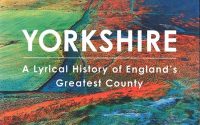Strata, sea and sky: three pioneers at work in nineteenth-century Yorkshire
- Date
- 29 Jan 2019
- Start time
- 7:30 PM
- Venue
- Tempest Anderson Hall
- Speaker
- Richard Morris, Professor Emeritus of Archaeology, University of Huddersfield

Strata, sea and sky: three pioneers at work in nineteenth-century Yorkshire
Richard Morris, Emeritus Professor of Archaeology, University of Huddersfield
Richard Morris’s recent book Yorkshire examines how England’s largest county took shape as a place and an identity. In this talk, he will single out three figures who are prominent in the book – the whaling master, Arctic navigator and (latterly) clergyman William Scoresby (1789-1857), the engineer and aeronautical pioneer George Cayley (1773-1857), and the geologist William Smith 1769-1839 – and look at aspects of their backgrounds, context, achievement, influence and legacy, and interactions between them.
Yorkshire by Richard Morris ISBN 9780297609438
Cover image Joe Cornish
Member’s report
These three significant pioneers, two of them Yorkshiremen, were all present in York for the inaugural meeting of the British Association for the Advancement of Science in 1831.
William Smith (1769-1839), ‘Father of English geology’, was well-known to YPS members, since our celebrations of his first geological map’s bicentenary in 2015. Falling on hard times in the 1820s, he was given shelter and employment at Hackness by Sir John Johnstone, who built Scarborough’s Rotunda Museum to display Smith’s remaining fossil collection.
Johnstone’s friend and near neighbour Sir George Cayley (1773-1857) in Brompton-by-Sawdon was also a familiar name, from his invention of a glider (he called it a skimmer). But the ‘Father of Aeronautics’ was also a polymath interested in every field of science and technology of his day.
William Scoresby (1789-1857), oceanographer, and clergyman, was born nearby in Cropton. He followed his father into whaling and became a Whitby master whaler. Enrolled at Edinburgh University to spend winters studying natural philosophy, he conducted experiments in marine biology on his subsequent Arctic voyages. He was the first to discover the existence of a food chain in marine creatures, and published a two-volume Account of the Arctic regions, still read a hundred years later. He entered the church after the death of his wife but life as vicar of impoverished, industrial Bradford cost him his health.
Bob Hale